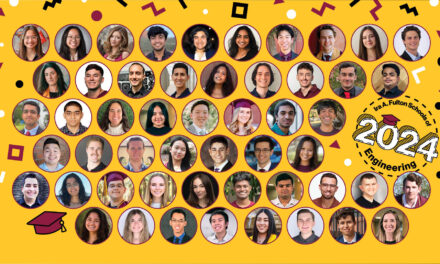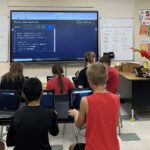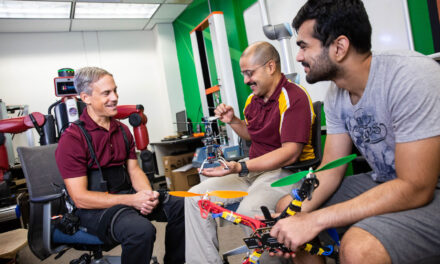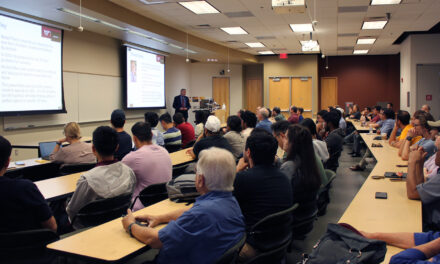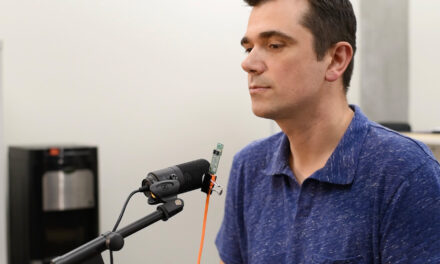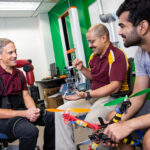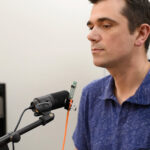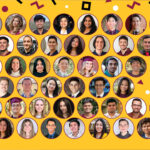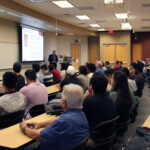
Vietnamese student entrepreneurs electrify wheelchairs
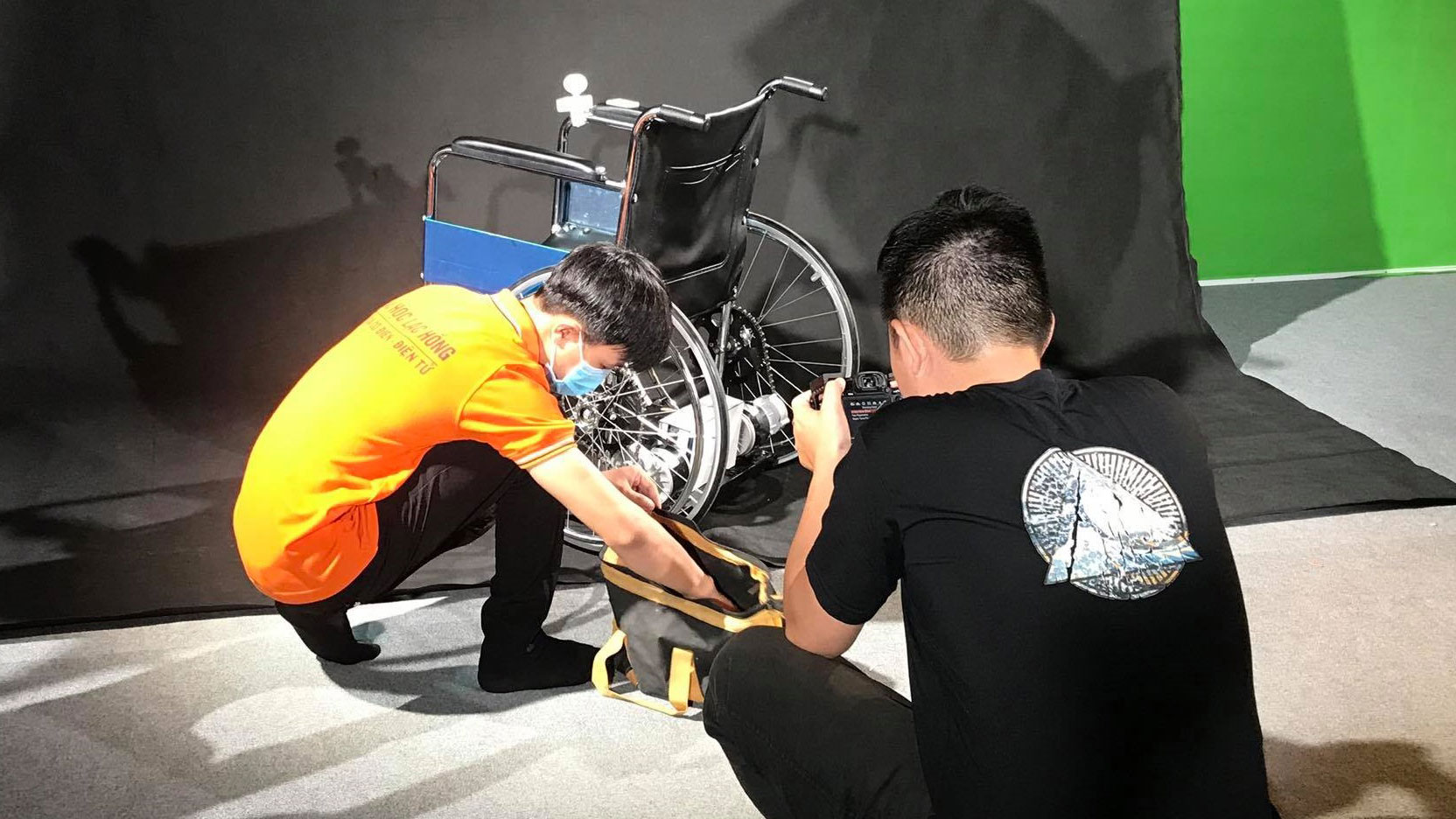
Above: A team of students from Lac Hong University in Vietnam participating in the Engineering Projects in Community Service, or EPICS, program developed a device to electrify manual wheelchairs. Arizona State University supports EPICS programs at six Vietnamese engineering universities as a way to empower young innovators to help their communities. Photo courtesy of Dr. Van Dinh Vy Phuong
Din Tuan Anh has dreamed of developing an electric wheelchair since he was in high school. Now a student at Lac Hong University in Vietnam, he is applying what he’s learned from Arizona State University’s Engineering Projects in Community Service program to turn his idea, AutoMov, into reality.
Engineering Projects in Community Service, known as EPICS, is a design challenge in the Ira A. Fulton Schools of Engineering at ASU through which university students identify an engineering-based community challenge and work as a team to create a working prototype for a solution. As the implementing partner of the United States Agency for International Development Building University-Industry Learning and Development through Innovation and Technology, or USAID BUILD-IT Alliance, ASU supports the EPICS program at six Vietnamese engineering universities as a way to empower young innovators to help their communities.
“With Lac Hong’s strong history of applied learning activities, their collaboration with ASU’s USAID BUILD-IT program facilitates the continued enhancement of their capabilities as a leading university in Vietnam,” says Jeffrey Goss, associate vice provost for Southeast Asia programs, executive director for the Office of Global Outreach and Extended Education and an assistant dean of the Fulton Schools. “AutoMov is an excellent example of impact that blends project-based learning and human-centered design to develop essential critical thinking and problem-solving skills to prepare students for success in the workplace.”
Anh led the AutoMov project in which a student team designed a wheelchair-assist device to convert a manual wheelchair into an electric version that the user can control with a joystick. The team’s new device helps create affordable electric wheelchairs without wasting manual ones, helping local people with disabilities gain better mobility to earn their living.
“BUILD-IT EPICS is the starter of the AutoMov project,” Anh says. “Team members can get support from a thorough training course to acquire knowledge in idea generation and project delivery,” Anh says. “Because of that, this project is on the right track to solving the right problems to best help users, and it has made strides on the path to becoming a business.”
In addition to Anh, AutoMov’s team includes Lac Hong University students Tran Truong Bang, Dang Ngoc Tai, Bui Thi Diem, Vuong Thi My Han and Phan Thi Thanh San, all of whom study mechatronics and electrical engineering.
Surveying stakeholders who are interested in electric wheelchairs steered the team away from creating a completely new wheelchair to developing supplemental components instead. By developing a solution that can be easily and affordably added to existing wheelchairs, the team is meeting the needs for most users without adding a financial burden.
The wheelchair modification device also has a solar panel that can collect and store energy while the user operates the wheelchair outdoors.
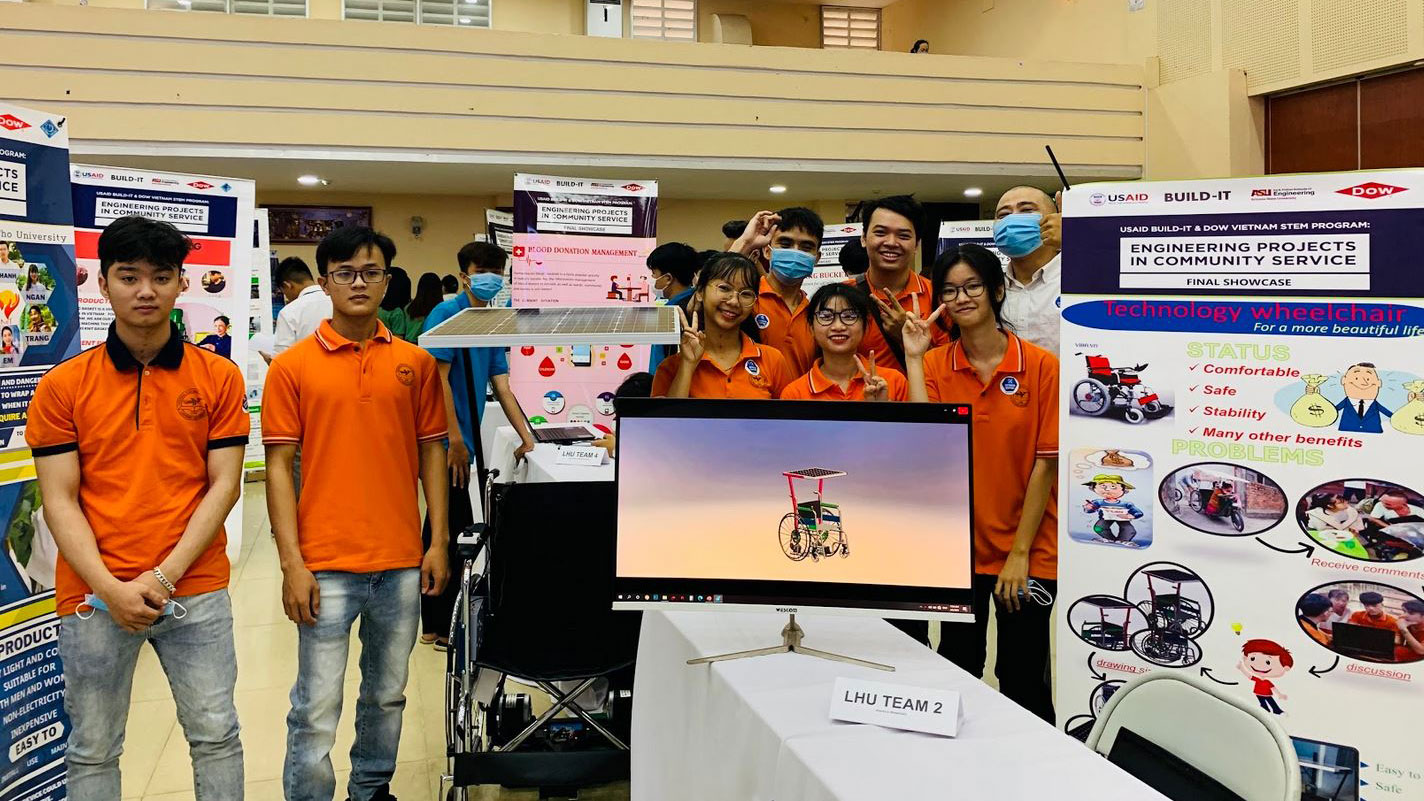
Members of the AutoMov team present their solution at the 2021 EPICS Final Showcase. Photo courtesy of Dr. Van Dinh Vy Phuong
The AutoMov team set out to design and build a working prototype in October 2020. On top of interruptions to implementation and challenges to communication when creating a prototype during a pandemic, they struggled with developing a product that could be easily integrated into several types of wheelchairs currently on the market.
However, teamwork among the AutoMov members and guidance from EPICS faculty mentor Dr. Van Dinh Vy Phuong, a lecturer of information technology at Lac Hong University who facilitates the BUILD-IT EPICS program, helped the team overcome obstacles. The team presented their prototype at the 2021 EPICS Final Showcase in October, winning first place.
Anh also sought out business administration and economics students to help the AutoMov team and joined the BUILD-IT Maker to Entrepreneur program this past April after their EPICS Final Showcase win to gain a better understanding of the process of bringing new products to market.
While the Maker to Entrepreneur program competition in Ho Chi Minh City was postponed due to the pandemic, the AutoMov team applied their entrepreneurship training instead to the Creative Idea Challenge competition, which is organized by the Ho Chi Minh City Department of Science and Technology.
This competition allowed them to improve their product and business model, and promote the idea to a wider market.
In October, the AutoMov team surpassed 300 other teams from across Vietnam to win the first-place prize in the Final Pitch event of the Creative Idea Challenge — adding to their success and increasing recognition from their community.
“The plan is now clearer than ever,” Anh says. “Moving forward, we will connect more members to form a product deployment team.”
They will work on legal aspects of their company, track market needs as well as collaborate with hospitals and other organizations for people with disabilities.
“Fundraising programs are also on the table to speed up the project’s development,” Anh says, “bringing more products to those in need and contributing to a favorable part of users’ lives.”






